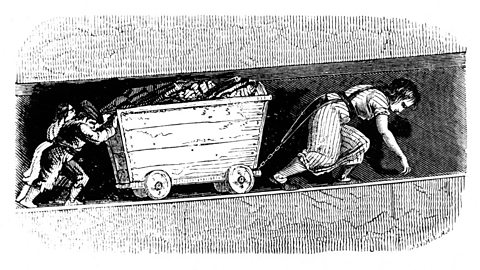Employment for immigrants
Irish immigrants
Many Irish people who arrived in Scotland were very poor, uneducated and unskilled. This meant that they were forced to take on whatever work was available, often working for the lowest wages.

Most had been farmers or had worked on farms as labourers. Some had skills in weaving and spinning and this was useful in some of the factories. Some Irish, especially from the North, had some experience in shipbuilding and therefore they were able to work in skilled trades.
There was little in the way of government legislation to provide protection from dangerous work practices or employment rights. As a result, workers could lose their jobs easily and had to put up with low wages.
Women and children could also work, especially in the mines. However, the Mines Act 1842 made this more difficult and by the end of the 19th century, there were restrictions on where and for how long women and children could work. For example, women and children under 10 were banned from working underground by 1842.
Italian immigrants
Many early Italian immigrants made their living by selling Catholic figures to the Catholic communities which were growing in Scotland. By the late 19th century, many had taken up work selling ice cream from barrows.
By the start of the 20th century, many were working in towns and cities throughout Scotland in the catering business. They set up cafes, restaurants, ice cream shops and fish and chip shops.
Some of the most famous of these shops include 'Nardiniâs' in Largs and Glasgow, as well as 'Valvona and Crolla' in Edinburgh. Many Italian immigrants also moved into hairdressing.
Jewish immigrants
By the end of the 19th century, many Jewish immigrants worked as university lecturers and traders in jewellery, furniture and hats, amongst other products.
Jewish people were also involved in tailoring and the tobacco industry with many becoming relatively wealthy. This resulted in some ill-feeling towards Jewish people - they were accused of undercutting prices and âsweatingâ (making them work long hours for little pay) employees.